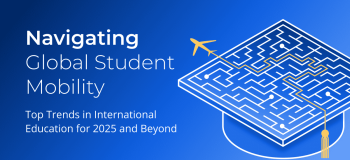Choosing to study abroad is an investment in your future, but it can stretch your wallet. Thankfully, there are many ways students can learn to make the most of their money. If you’re wondering how you can maximize your student budget, no matter how big or small, you’re in the right place. Keep reading to discover �����鶹’s top four tips to help international students optimize their budgets while minimizing financial concerns.

1. Understand Your Income and Expenses
Most students will find they can sort their income and expenses into a few categories. Knowing where your money is coming from and how it’s being spent is an essential step to maximizing your budget.
Below is a brief overview of the major categories your funds will fit into:
Total Income: Any money you earned or brought to your destination country
This includes the following:
- Assistance you receive from your financial aid office
- Money from family members
- Grants and bursaries
- Scholarships
- Loans
- Savings
- Money earned from work
Monthly Income: Recurring funds that you receive monthly from a job or another income source, such as an investment
Emergency Funds: Money that you’ve set aside to cover any emergency or unexpected costs
Variable Expenses: Wants or necessities with costs that vary month to month
Fixed Expenses: Wants or necessities with costs that remain constant every month
Add a dollar value to the above incomes and expenses to estimate how much money you’ll have to work with on a monthly basis. This can be as simple as entering and tracking amounts in an Excel or Google Sheets file, or using a budgeting app like or .
Financial Questions International Students Should Consider When Studying Abroad

2. Volunteer with Your Institution’s Arts and Sports Organizations
One of the best parts of studying abroad can be attending the clubs and events on campus. However, as fun as these gatherings can be, they often come with a price tag. A great way to enjoy all of the fun at no cost is to volunteer with one of your institution’s sports or arts organizations.
If you enjoy watching sporting events, consider volunteering with the basketball or soccer team. And if you’re more into the arts, volunteer with your institution’s theatre or gallery program. This way, you’ll be able to enjoy shows or games for free, and meet many like-minded people in the process.
Bonus: Many academic institutions will provide their student volunteers with cool spirit apparel like hoodies, hats, or scarves.

3. Rent or Buy Your Textbooks Second-Hand
You’ll find the cost of textbooks can take up a large chunk of your budget. Although purchasing a textbook is a requirement for most classes, it doesn’t mean that you can’t buy them cost-effectively.
A great place to begin your hunt for second-hand textbooks is your institution’s book store. If you want to save yourself time, give them a call beforehand and see if they have what you’re looking for. Many times they’ll put books on hold for students. Another place to search is on Facebook or other online forums. Find a group for your graduating class, program, or course, and ask to join it. Here, students will usually try to sell their textbooks at a discounted price. Also, you might be able to find and rent your textbooks on or through your institution’s library.
It’s important to note that second-hand textbooks go quickly, so be sure to begin purchasing your books as soon as you receive your list from your instructor.
Tip: Once you’ve passed the class, try selling your textbooks back to your institution’s book store, a friend, or another student to make some money back.

4. Review Your Services and Subscriptions
Many students spend money on services and subscriptions that they don’t even use. Typically, these payments are automatically deducted from your bank account, and you may not even notice how much this is hurting your finances.
A great step towards maximizing your budget is to review your services and subscriptions to see which ones truly spark joy for you. Cancel any subscriptions or services if they:
- Are duplicates.
- Aren’t used regularly.
- Can be substituted with a free option available online, through your school, or through your community or institution’s library. Some library cards give students access to music, movies, comics, online learning, and online books.
If you really can’t say goodbye to that subscription or service, ask yourself the following questions:
- Am I eligible for a student account? It’s almost always cheaper.
- Are dual or family subscription plans available? If they are, ask friends or family if they’d like to split the bill on a shared plan.
- Can I negotiate my fees down with my service provider? This will have a positive impact on your budget, as you save from month to month.
Keep an eye out for our cost of living series that will go live next week on �����鶹’s blog.
Use these tips and tricks to maximize your student budget. That way, you can afford to experience the things that mean the most to you during your time abroad!
Head over to the �����鶹 Platform to find your perfect academic institution and program today!







